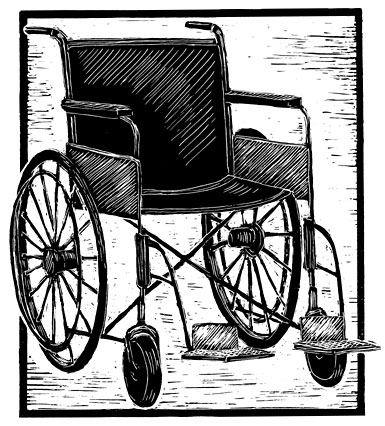Student Perspective
A boundless world
By Wendy Gray and
Timothy Burdick
Sit down in a chair. Cross your left foot over your right foot. Clench your fingers into tight fists. Imagine that you can move only your head and that you can't speak clearly. If you tighten every muscle in your body at the same time, you'll be contorted into a tight bundle and have a grimace on your face. Now imagine that you have to sit in that chair—make it a wheelchair—in that position for your entire life. This is the way that some people with cerebral palsy (CP) must live.
Opportunities: Now imagine how it would feel to be lifted out of that wheelchair onto a horse or into a custom-built Windsurfer. Since 1953, Camp Jabberwocky, on Martha's Vineyard, has been providing recreational opportunities— swimming in the ocean, riding horses, paddling canoes, dancing to live rock bands, participating in a July 4th parade—to people of all ages with CP and other disabilities. We were privileged to be volunteer counselors there.

|
|
Imagine that you have to sit in a wheelchair for your entire life.
Now imagine how it would feel to be lifted out of that
wheelchair onto a horse or into a custom-built Windsurfer. |
Wendy Gray: I had two jobs at Camp Jabberwocky: counselor and "doctor." As "Dr. Wendy," I helped the staff nurse provide medical care for campers, counselors, and staff. There were two volunteer physicians, too, who oversaw diagnoses, treatment decisions, and prescriptions. As a counselor, I worked one-on-one with one of the younger campers—a playful, spirited, giggly eight-year-old girl named Nancy. Nancy has CP, but it affects only the left side of her body. She would run with her left leg swinging in front of her and her left arm waving at her side. Together we learned about the many faces of cerebral palsy.
Tim Burdick: Like Wendy, I was a counselor and a "doctor" at Camp Jabberwocky. I worked one-on-one with Randy, a 50-year-old man from Massachusetts. Randy can't speak or hear well, and he needs assistance with almost all of his daily activities. At night whenever his voice woke me—I learned quickly to distinguish his shouts from those of the other campers—I would get up and help him from his bed into the bathroom.
Passion: Randy is a sweet guy with a passion for peanut butter-andjelly sandwiches. I would hold a sandwich to his mouth as he ate it, occasionally wiping the peanut butter from his moustache. When he finished one sandwich, he'd look at me imploringly, gesture toward the platter, and plead for me to feed him another. One day as I was fetching food from the kitchen, I caught a glimpse of Randy feeding himself quite well. When I called his bluff, he looked at me with his gentle blue eyes and jelly-covered smile and we laughed together.
Wendy Gray: I also got to know Hannah, a camper in her twenties whose CP affects her entire body. I discovered that she has a terrific sense of humor and a personality similar to mine. She uses a custom-made wheelchair that is equipped with arm and leg restraints which help keep her limbs from flailing around and hurting anyone. She is almost always moving in one way or another. She has limited control over her mouth and tongue, so it may take half an hour or more to have a meaningful conversation with her. I would talk with her during dinner as I fed her with a plastic spoon or while we sat together at the beach in a dug-out hole big enough to hold both of us. As I learned to understand her speech more easily, I came to appreciate her smartaleck one-liners. We were always cracking up. She would tell me about her boyfriend, about her work at home, and about pieces of camp gossip that she had picked up during the day.
What is so wonderful about Camp Jabberwocky is that everyone spends so much time together that we learn to understand each other's speech. The exterior presentation of a person is not an obstacle once you learn how to really communicate with someone.
Tim Burdick: As "Dr. Tim," I began to understand the special medical needs of people in wheelchairs. One afternoon another counselor asked me to help Larry, a 40-year camp veteran. Larry has limited control of his limbs, spasticity in his arms, and difficulty speaking. But he is nevertheless very "articulate." He types on a computer keyboard with a pointer that is attached to a headband, and he has even written articles for newspapers. Still, doing a physical exam on him was challenging. As I asked him a series of yes-or-no questions, Larry indicated that he had some pain in the carpal-metatarsal joint of his left thumb. Once I discovered that his hand was constantly bumping against the spokes of his wheelchair, I was able to fashion a metal and foam splint to protect his thumb joint.
Lessons: My Camp Jabberwocky experiences also taught me that disabilities don't have to keep people from having fun. With our help, campers went to the beach for picnics, made ceramic bird-feeders, played in the Atlantic surf, and stayed up until midnight dancing to the music of a local rock band.
Camp Jabberwocky represents a magical and boundless world. It is a place far from the group homes and sheltered worlds where these campers spend most of their lives. The memory of my time there shines as an ideal of what practicing medicine should be. �
Wendy Gray, a Brown-Dartmouth '04, and Tim Burdick, a DMS '02, were volunteer counselors at Camp Jabberwocky, a camp for children and adults who have cerebral palsy or other disabilities. Gray has spent two summers at the camp, which is located on Martha's Vineyard. Burdick did a clinical rotation there as a third-year student. To protect the privacy of the individuals mentioned here, their names have been changed.
